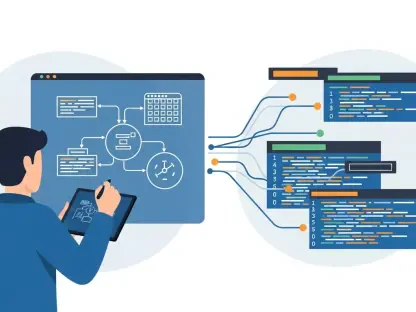In an era where digital transformation dictates the pace of business, the app development industry grapples with a staggering demand for speed and accessibility, yet remains constrained by skill shortages and lengthy timelines. Recent data indicates that over 80% of businesses face delays in app deployment due to a lack of qualified developers, creating a bottleneck in innovation. This pressing challenge sets the stage for a seismic shift, as artificial intelligence emerges to redefine how software is created. At the forefront of this transformation stands Lovable.dev, a Stockholm-based platform launched to empower both novices and experts alike. By leveraging AI to streamline app creation, this tool promises to bridge the gap between idea and execution, inviting curiosity about how such technology could reshape the tech landscape.
The Current Landscape of App Development
The app development sector today is a dynamic blend of traditional coding practices and evolving technological paradigms. Dominated for years by manual programming, the industry relies heavily on skilled professionals fluent in complex languages like JavaScript and Python. However, this approach often results in extended project timelines and high costs, limiting participation to those with technical expertise. The growing need for rapid deployment in a competitive tech ecosystem has exposed these inefficiencies, pushing companies to seek faster alternatives while still maintaining quality.
A notable trend reshaping this space is the rise of no-code and low-code platforms, which aim to democratize development by simplifying the process for non-technical users. Tools like Bubble and OutSystems have gained traction, enabling business owners and entrepreneurs to build applications with minimal coding knowledge. Yet, these solutions often lack the depth required for sophisticated projects, leaving a gap for more advanced yet accessible options to emerge.
The integration of AI technologies marks the latest frontier, with major players like GitHub Copilot and emerging startups experimenting with automated code generation. This shift reflects a broader push toward efficiency, as AI promises to slash development times and reduce dependency on specialized skills. Despite these advancements, barriers such as steep learning curves and scalability concerns persist, excluding many potential creators from fully participating in the digital economy.
Lovable.dev: A Game-Changer in AI-Driven Development
Key Features and Innovations
Lovable.dev distinguishes itself in the crowded app development market through a suite of AI-powered tools designed to simplify and accelerate software creation. At its core, the platform uses natural language processing to interpret plain English instructions, converting user ideas into functional web applications. This means that individuals without coding experience can describe their vision—such as a task management app with specific functionalities—and see it materialize in minutes using modern frameworks like React and Node.js.
Beyond accessibility, the platform supports full-stack development, handling both frontend and backend requirements seamlessly. Features like GitHub integration allow users to export and own their code, while customizable UI components and one-click deployment streamline the process from concept to launch. These capabilities cater to a diverse audience, including startups crafting minimum viable products and seasoned developers seeking to automate repetitive tasks.
The efficiency gains are striking, with development time reduced by up to 80% compared to traditional methods. Collaboration tools further enhance its appeal, enabling teams to work together in real time, while the focus on production-grade code ensures reliability. By balancing simplicity with sophistication, Lovable.dev empowers a wide range of users to bring digital solutions to life without the usual hurdles.
Market Impact and Growth Metrics
Since its inception, Lovable.dev has rapidly ascended to prominence, achieving a valuation of $2 billion and generating $100 million in annual recurring revenue. Recognized as one of Europe’s fastest-growing AI startups, the platform has captured the attention of major investors like Accel, whose backing underscores confidence in its disruptive potential. This financial success reflects a strong market appetite for tools that simplify and expedite app creation.
Growth projections remain optimistic, with expectations of expanding user adoption across various sectors in the coming years, from 2025 to 2027. The platform’s ability to serve both individual entrepreneurs and large enterprises has fueled its traction, positioning it as a versatile solution in a competitive field. Such metrics highlight not just a product’s success, but a broader shift in how businesses perceive and invest in AI-driven development tools.
This meteoric rise also signals a changing tide in the industry, where speed and accessibility are becoming non-negotiable. As more companies turn to Lovable.dev to meet tight deadlines and budget constraints, its influence on market dynamics continues to grow. The blend of innovation and proven results cements its status as a leader in redefining software creation.
Challenges in AI-Powered App Development
While Lovable.dev offers groundbreaking solutions, it faces significant hurdles in fully transforming the app development landscape. One primary concern is its capacity to handle complex, enterprise-grade projects that often demand nuanced customization beyond AI’s current capabilities. Such applications may require intricate integrations or unique architectures, areas where automated systems sometimes fall short without manual intervention.
Scalability and code optimization present additional obstacles, as AI-generated code may not always meet the performance standards needed for high-traffic or data-intensive platforms. Human oversight remains essential in these scenarios to refine outputs and ensure reliability, which can offset some of the time savings promised by automation. This dependency on expert input highlights a limitation in achieving complete independence from traditional development skills.
Cost is another factor, particularly for smaller teams or solo developers who may find premium features priced out of reach. To address these issues, Lovable.dev is actively working to enhance AI accuracy through iterative model improvements and introducing more flexible pricing tiers. These strategies aim to broaden access while tackling technical constraints, ensuring the platform evolves to meet diverse user needs over time.
Navigating the Regulatory and Ethical Landscape
The integration of AI in app development brings with it a complex web of regulatory and ethical considerations that Lovable.dev must navigate. Data privacy laws, such as the General Data Protection Regulation in Europe, impose strict guidelines on how user information is handled during app creation, requiring robust safeguards. Compliance with these regulations is critical to maintaining trust and avoiding legal repercussions in a global market.
Intellectual property concerns also arise, particularly around ownership of AI-generated code and the potential for unintended replication of copyrighted material. Transparency in how algorithms make decisions further complicates the landscape, as users and regulators demand clarity on automated processes. These issues underscore the need for clear policies and frameworks to govern AI tools in development environments.
Lovable.dev addresses some of these challenges through features like code ownership via GitHub export and secure collaboration tools that prioritize user control. By embedding security and accountability into its platform, it aims to mitigate risks while fostering confidence among its user base. As regulations around AI continue to evolve, the broader impact on adoption rates and industry standards remains a key area to watch, shaping how such technologies are integrated into everyday workflows.
The Future of App Development with AI and Lovable.dev
Looking ahead, the trajectory of app development appears increasingly intertwined with AI, and Lovable.dev is poised to lead this evolution. Industry forecasts suggest that by 2030, nearly 70% of app prototypes will be generated through AI tools, a shift driven by the need for speed in innovation cycles. This trend points to a future where barriers to entry are significantly lowered, enabling a wider pool of creators to participate in the digital space.
The role of developers is also expected to transform, moving away from syntax-heavy tasks toward a focus on logic, user experience, and strategic oversight. AI assistants are likely to become standard in professional workflows, acting as force multipliers rather than replacements for human expertise. This redefinition of skills emphasizes creativity and problem-solving over rote coding, potentially reshaping educational and hiring priorities in tech.
Emerging trends such as global demand for rapid solutions and increased accessibility further bolster Lovable.dev’s position as a market leader. Amid economic fluctuations and technological advancements, the platform’s adaptability to diverse needs—from solo innovators to corporate giants—ensures its relevance. As AI continues to mature, its potential to standardize and accelerate app creation could redefine competitive edges across industries worldwide.
Conclusion
Reflecting on the insights gathered, Lovable.dev has carved a transformative path in app development by shattering traditional barriers with AI-driven efficiency. Its journey underscores a pivotal shift toward accessibility, empowering countless individuals and businesses to turn concepts into reality swiftly. Yet, challenges like scalability and regulatory navigation persist as critical hurdles that demand attention.
Moving forward, a strategic focus on enhancing AI capabilities for complex projects emerges as a vital next step, alongside efforts to make premium features more affordable for smaller teams. Expanding market reach to diverse, underserved user bases also stands out as a promising avenue for growth. These considerations pave the way for a future where innovation becomes truly inclusive, ensuring that the digital age welcomes creators from all walks of life.









